How To Choose the Right
Mental Health Provider
Home » How To Choose the Right Mental Health Provider
Mental health is the cornerstone of our overall well-being and quality of life. It influences our thoughts and feelings and plays a crucial role in coping with stress, building meaningful relationships, and engaging in our communities.
It’s important to acknowledge that mental health challenges affect many people. According to the National Alliance on Mental Illness (NAMI), around 47.6 million adults in the United States faced mental health issues in 2018. Among them, about 4.6% lived with serious mental illness, which significantly impacted their daily lives and overall functioning.
Unfortunately, seeking help for mental health challenges can be difficult due to the stigma surrounding these issues, the high cost of treatment, or a lack of access to mental health care. Additionally, finding the right type of care and the right provider can be another significant obstacle.
This comprehensive guide will explore the diverse array of mental health care providers, provide valuable steps to help you find the ideal match, and highlight important red flags to remain aware of during your journey.

Table of Contents
- Understanding the Different Types of Mental Health Providers
- Different Modalities Of Therapy
- Why Mental Health Provider Specializations Matter
- Key Steps for Choosing the Right Mental Health Provider
- Red Flags To Look Out for When Choosing a Mental Health Provider
- Risks of Medical Malpractice If Choosing the Wrong Provider
- How To Report Issues With a Mental Health Provider
- Resources Available for Those Seeking an Emergency Mental Health Provider
- Key Statistics and Facts About Mental Health in the U.S.
- Get Help if a Mental Health Provider Delivers Unethical Standards of Care
Understanding the Different Types of Mental Health Providers
Understanding the services different mental health providers offer can help you confidently select the best one for your needs. Here’s an overview of each type and the services they offer:
Therapist
Therapists are also called counselors or clinicians, depending on the setting. They must have a master’s degree in a mental health-related field and state-required licensure and certifications. They can:
- Evaluate a person’s mental health
- Provide therapy
Common services a person may see a therapist for include family therapy, grief counseling, career and school counseling, and substance abuse counseling.
Psychologist
Psychologists hold doctoral degrees in psychology and are trained to evaluate a person’s mental health. They may also be trained in specific types of treatment, such as cognitive behavioral therapy. Psychologists can:
- Make diagnoses
- Provide Individual and group therapy
While there is some overlap between therapists and psychologists, you may want to consider seeing a psychologist if you are experiencing severe symptoms that disrupt daily life and you want to focus on changing thought patterns and behaviors.
Psychiatrist
Psychiatrists are licensed medical doctors who have completed psychiatric training. They can:
- Diagnose mental health conditions
- Prescribe medications
- Provide therapy
A key factor that sets psychiatrists apart from therapists and psychologists is their ability to prescribe medications. A psychiatrist can evaluate your symptoms and determine if medication is a treatment option you should consider.
Different Modalities Of Therapy
Finding the right type of therapy can sometimes take time, and it’s understandable to feel discouraged if your first choice doesn’t quite meet your hopes. If you’re uncertain about the different types of therapy available, here is an overview of common options:
- Cognitive Behavioral Therapy (CBT): A type of talk therapy that is structured and goal-oriented.
- Psychodynamic Therapy: An in-depth form of talk therapy that helps patients understand how their past experiences influence their current behavior and functioning.
- Dialectical Behavior Therapy (DBT): A type of talk therapy that focuses on helping patients develop skills to manage strong emotions.
- Eye Movement Desensitization and Reprocessing (EMDR): Known for its role in treating post-traumatic stress disorder, EMDR is a method that involves the patients moving their eyes in a specific way while processing traumatic memories.
- Acceptance and Commitment Therapy (ACT): A form of therapy that involves the patient learning to understand their feelings instead of changing them.
- Art Therapy (ART): Helps people of all ages improve their physical, mental, and emotional health by creating art.
- Somatic Experiencing Therapy: Aimed at treating trauma and stress-related disorders by helping patients release damaging emotions stored in their bodies.
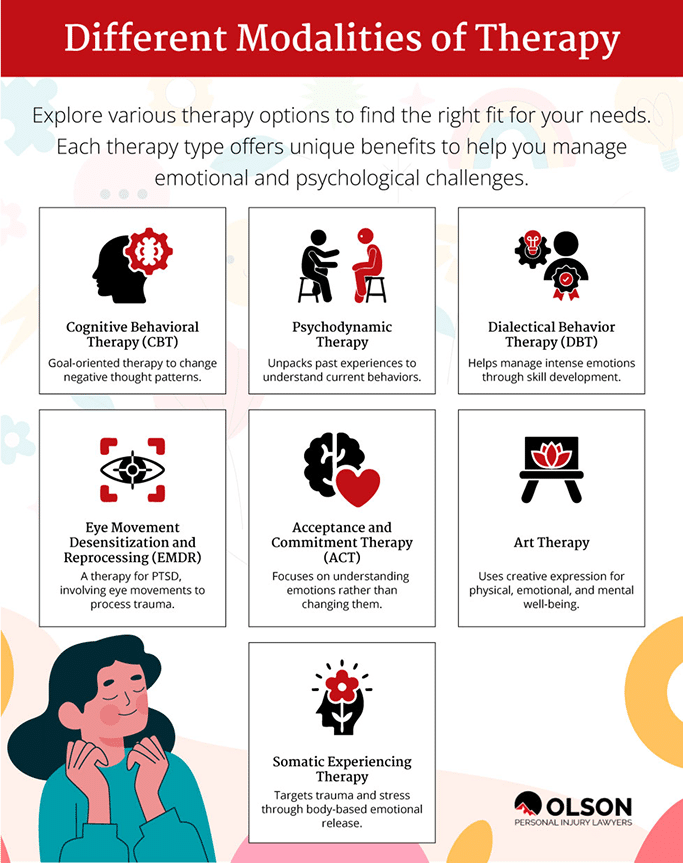
Why Mental Health Provider Specializations Matter
Many mental health providers specialize in different conditions. It’s important to find one who can address your specific needs, as they will have a deeper understanding of your situation and can offer more tailored treatment options.
If you’re unsure whether a particular provider is the right fit for you, consider asking if they offer a free evaluation before you commit. This allows you to feel more comfortable and confident in your choice. Remember, you deserve to find someone who truly resonates with you and your circumstances.
Here are some common specializations:
- Anxiety: The most common type of mental health concern in the United States, anxiety is the overwhelming feeling of fear and distress that can prevent individuals from doing everyday activities.
- Depression: Symptoms can vary from person to person, but depression can have both physical and emotional symptoms that, if left untreated, can be fatal.
- Post-Traumatic Stress Disorder (PTSD): This can develop after a person experiences or witnesses a traumatic event and can result in a range of symptoms, such as negative changes in mood and thinking, and intrusive memories.
- Obsessive-Compulsive Disorder (OCD): A disorder that is characterized by recurring, unwanted thoughts, urges, or images that trigger certain repetitive behaviors.
- Personality Disorders: Long-lasting thinking, behavior, and mood patterns that disrupt normal functioning and may lead to abnormal behaviors and a distorted perception of reality.
- Attention Deficit Hyperactivity Disorder (ADHD): A condition that makes it more difficult for individuals to control their attention or focus on specific tasks.
- Eating Disorders: A serious mental illness that impacts a person’s relationship with food and can be life-threatening.
- Substance Abuse Disorder: A problematic pattern or dependence on drugs or substances that negatively impacts your health and overall quality of life.
- Child and Adolescent Therapy: A form of counseling tailored to address children and teenagers’ unique emotional and behavioral needs.
- Couples and Marriage Therapy: Helps partners improve their relationships by addressing specific issues and fostering healthier communication patterns.
- Family Therapy: Similar to couples therapy, this type of counseling aims to enhance family dynamics, resolve conflicts, and improve problem-solving skills within the family unit.
- Grief and Loss Counseling: A form of therapy that helps people cope with the emotional and psychological distress following a significant loss, such as the loss of a loved one.
- Anger Management Therapy: A form of treatment that is aimed at teaching people coping skills to manage their anger effectively.
- Gender and Sexual Identity Therapy: Designed to help individuals explore and understand their gender identities and sexual orientations.
Key Steps for Choosing the Right Mental Health Provider
With many nursing home residents unable to recognize or report abuse themselves, it often falls to loved ones to notice the signs. These may include:
1. Identify Your Needs
Think about the issues you want to address and the type of care you need. It’s a good idea to start with a therapist, as they can guide you through treatment options and advise you on whether you should also see a psychologist or psychiatrist.
2. Research Your Options
According to Johns Hopkins Medicine, about one in four adults experiences a diagnosable mental disorder in a given year. With this in mind, you likely know someone—or multiple people—receiving treatment from a mental health professional. Consider asking for recommendations from familiar and trusted sources, such as friends and family.
You can also search for nearby or remote mental health care professionals online. If you choose this route, read reviews left by current and former patients on various crowd-sourced review websites and discussion boards.
3. Consider Practical Aspects
When choosing a mental health provider, practical factors such as location, availability, insurance coverage, and out-of-pocket costs should be considered.
While many mental health providers offer remote services today, this option may not suit everyone. If you prefer in-person visits, consider the distance from the provider’s office to your home or workplace and whether commuting would be a challenge.
Additionally, if the in-person provider has limited office hours, you might want to look for other options that better fit your schedule.
Lastly, if you have insurance and want to use it, make sure to check whether the provider accepts your insurance plan. If the provider does not accept insurance or is out-of-network, determine whether their services are financially manageable for you.
4. Evaluate Credentials and Experience
It’s important to take the time to understand your mental health provider’s professional qualifications and certifications. It can also be helpful to ask about their specific experience related to your concerns so that you can feel confident in their support. Your well-being matters; seeking a provider who truly understands your needs is a crucial step in your journey.
5. Evaluate the Provider’s Approach
Evaluate the provider’s therapeutic techniques and methodologies, including whether they adopt a client-centered or evidence-based approach to treatment. This information can be obtained by calling their office, checking their website, or reading client reviews on discussion boards.
Finding the right mental health provider can often feel like a challenging journey. Many individuals experience this process, sometimes meeting with several professionals before discovering the right fit. If you’re frustrated because you haven’t found the right fit yet, know it’s perfectly okay to explore options with different providers.
Red Flags To Look Out for When Choosing a Mental Health Provider
When looking for a mental health provider, it’s important to approach your search with care and awareness. Keep an eye out for any potential red flags that may indicate the need for caution in your decision-making. Red flags to look out for include:
- Lack of transparency in communication
- Unwillingness to answer questions or provide information
- Excessive focus on medication without a comprehensive plan
- Pressure to conform to one approach or style
- Bad reviews online or a lack of reviews
Risks of Medical Malpractice If Choosing the Wrong Provider
Choosing the right medical provider is essential for your well-being. Finding someone who doesn’t quite resonate with you can be disheartening. In more serious situations, this choice could lead to entrusting your care to someone who may not uphold the ethical standards or responsibilities we all deserve in our health care journey.
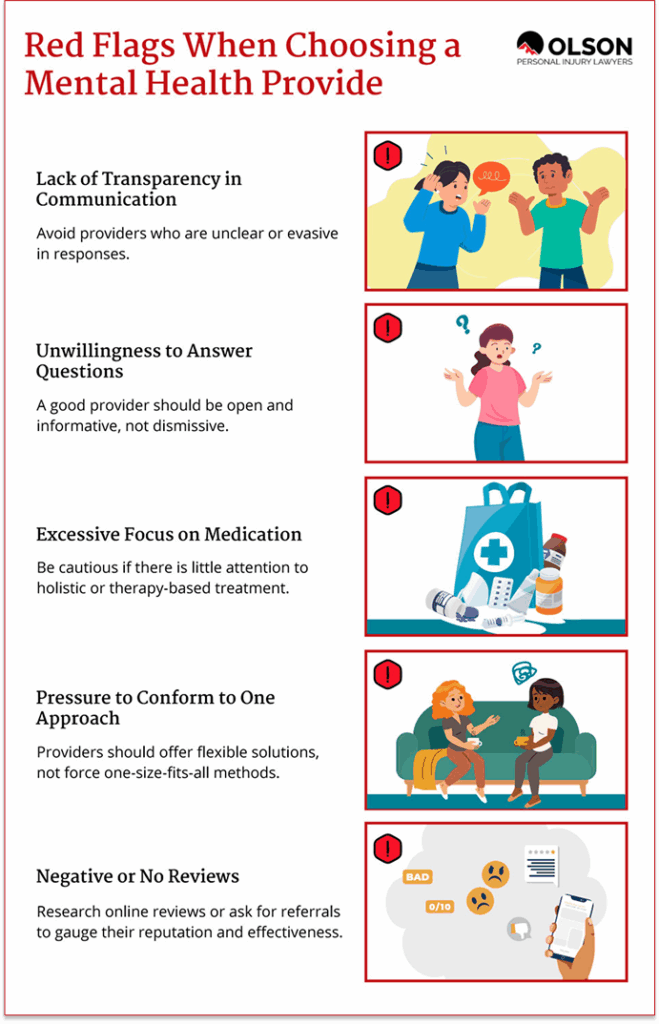
What Is Mental Health Medical Malpractice?
Medical malpractice in the mental health field can be deeply distressing for patients and their loved ones. It occurs when a mental health professional does not meet the expected standard of care, leading to unfortunate consequences for the individual seeking help. This may include misdiagnosis, inappropriate treatment choices, medication errors, and breaches of confidentiality.



The Dangers of Prescribing Medications Without a Proper Diagnosis
Without a proper diagnosis, any chosen treatment may not effectively address the actual condition. Prescribing medication without a proper diagnosis can hinder the identification of the correct condition by treating only the symptoms rather than addressing the root cause.
Additionally, an inappropriate prescription may pose unnecessary risks of side effects by having the patient take a medication that is not needed.
Consequences of Choosing the Wrong Provider
If a mental health provider is negligent in managing your care, it can lead to long-term effects on your mental health, finances, and overall well-being. However, legal options are available for patients who are victims of medical malpractice.
Examples of Mental Health Medical Malpractice
These two impactful cases highlight where failures in mental health care have led to patient harm:
The Matthew Perry Ketamine Case: In mid‑2025, Dr. Salvador Plasencia pled guilty in federal court to illegally distributing ketamine to actor Matthew Perry in the weeks before his overdose death. His actions, driven by profit rather than patient well‑being, underscore the grave risks of unsupervised at‑home use of powerful psychiatric drugs.
Options Behavioral Health (Acadia Healthcare), Indianapolis: A complaint filed in 2024 details a patient’s experience at a behavioral health facility in Indiana, where she was involuntarily held beyond her consent, subjected to demeaning treatment, photographed against her will, and denied psychiatric evaluation. This case exemplifies systemic neglect and financial exploitation in mental health settings.

How To Report Issues With a Mental Health Provider
If you feel that your mental health provider is engaging in practices that seem unethical or harmful, it’s important to know that you have options. Reaching out to your state’s Department of Mental Health and the relevant licensing boards can be a good step to voice your concerns and seek an investigation. It might also be helpful to talk to a medical malpractice attorney who can guide you on how to proceed.
Resources Available for Those Seeking an Emergency Mental Health Provider
If you need immediate mental health attention, here are some options for emergency counseling:
- 988 Suicide and Crisis Lifeline: Call or text 988, or chat online at 988lifeline.org.
- Veterans Crisis Line: Call 988 and press 1, or text 838255.
- Maternal Mental Health: Call or text 1-833-TLC-MAMA (833-852-6262)
Key Statistics and Facts About Mental Health in the U.S.
Mental health disorders affect millions of Americans each year, creating a pressing need for accessible and effective care.
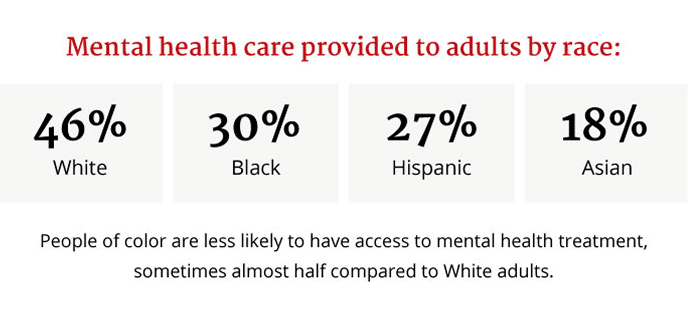
Mental Health Conditions by Race
Racial and ethnic disparities significantly influence mental health experiences and access to care in the U.S. While the overall prevalence of mental illness may be comparable across groups, marginalized communities often face barriers to diagnosis, treatment, and culturally responsive care.
- Black adults have the highest rate of mental health–related emergency department visits, with 96.8 visits per 1,000 adults between 2018 and 2020—nearly double that of White adults.
- Mental health service use among those experiencing any mental illness falls sharply by race: roughly 46% of White adults receive care, compared to 30% of Black, 27% of Hispanic, and just 18% of Asian adults.
- Even with similar or higher severity of mental health symptoms, Black, Hispanic, and Asian adults are far less likely to access mental health treatment, with utilization rates sometimes less than half that of White adults.
Mental Health Statistics by Condition
Mental health conditions vary widely in prevalence, but common disorders such as anxiety, depression, and bipolar disorder affect millions across the U.S. each year:
- Anxiety Disorders: Affect approximately 19.1% of U.S. adults annually.
- Major Depressive Episodes: Around 8.3% of U.S. adults had at least one major depressive episode in 2021.
- Bipolar Disorder, PTSD, OCD: Estimated annual prevalence stands at 2.8% (bipolar), 3.6% (PTSD), and 1.2% (OCD).
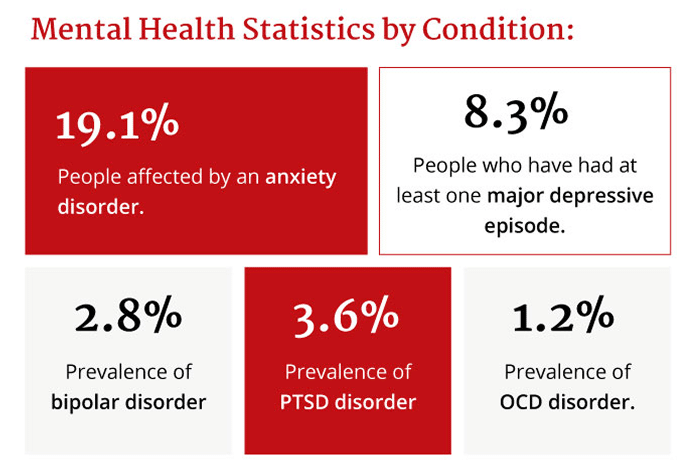
Statistics About Untreated Mental Health Issues
Many Americans who experience mental health conditions do not receive the care they need, often due to access barriers, stigma, or misdiagnosis. Delays in treatment are common, which can compound symptoms and diminish quality of life.
According to NAMI:
- Over 50% of adults with mental illness did not receive treatment in 2021.
- The average delay between symptom onset and treatment is approximately 11 years.
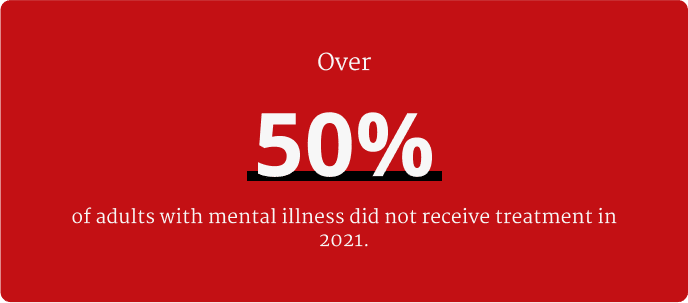
Get Help if a Mental Health Provider Delivers Unethical Standards of Care
When we turn to mental health professionals for care, we trust their experience and commitment to our well-being. Unfortunately, there are moments when this trust isn’t upheld, which can result in serious emotional, physical, and financial repercussions. While not every unfortunate experience constitutes malpractice, it’s important to know that if you are in such a situation, you are not alone in seeking justice and support.
At Olson Personal Injury Lawyers, our medical malpractice attorneys can investigate your claim, determine liability, and advocate for you in court. Contact us today for a free case evaluation.







